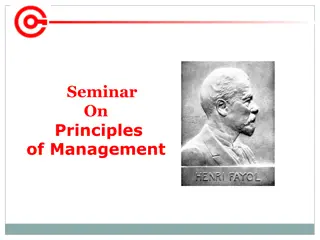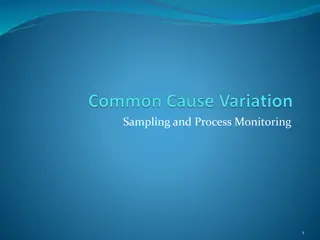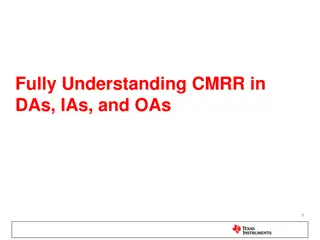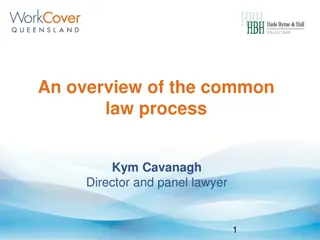ILO Fundamental Principles and Rights at Work
Explore the 5 fundamental principles and rights at work outlined by the ILO, emphasizing social justice and decent work. Delve into how these principles connect with ILO conventions and discuss challenges in their application to Pacific Island Countries.
0 views • 15 slides
Understanding Open Government Data Principles and Benefits
Open Government Data (OGD) principles and policies play a vital role in promoting transparency, citizen engagement, innovation, and data-driven decision-making in government operations. Governments worldwide are adopting open data policies to enhance accessibility, reusability, collaboration, privac
0 views • 36 slides
Principles of the Ghana Civil Service Code of Conduct
The Code of Conduct for the Ghana Civil Service, outlined by Elizabeth Obeng-Yeboah, emphasizes principles such as abiding by the constitution and laws with dignity, integrity, and professionalism. It sets standards for conduct, avoiding conflicts of interest, maintaining political neutrality, and u
1 views • 34 slides
InterManager's General Principles of Conduct and Action
InterManager, a prominent trade association in the shipping industry, has established General Principles of Conduct and Action to uphold ethical standards, promote safety, environmental protection, and continuous improvement. These principles guide members towards integrity, professionalism, and acc
2 views • 72 slides
Advocating Together for Academic Freedom - Importance and Principles
Advocating for academic freedom is crucial for the advancement of knowledge and quality education. The American Association of University Professors (AAUP) champions academic freedom, shared governance, and economic security for faculty members. The 1940 Joint AAUP/AAC&U Statement of Principles on A
4 views • 14 slides
Understanding the Core Principles of the 2030 Agenda for Sustainable Development
Explore the key features and principles of the 2030 Agenda for Sustainable Development with a focus on its core principles of Universality, Leaving No One Behind, Interconnectedness and Indivisibility, Inclusiveness, and Multi-stakeholder Partnerships. This comprehensive agenda encompasses 17 Sustai
4 views • 11 slides
Overview of Common Procedure for Requesting COAMU Advice
This content provides information on the common procedure for requesting COAMU advice in the Brabant Wallon, Hainaut, Namur, Liège, and Luxembourg regions. It covers topics such as the legal basis, reasons for procedure reform, principles of the new procedure, and steps for implementation. Key poin
10 views • 16 slides
Academic Freedom and Shared Governance in Higher Education
Academic Freedom and Shared Governance are foundational principles advocated by the American Association of University Professors (AAUP) to ensure educators have the freedom to explore, research, teach, and discuss without censorship. These principles empower educators to enhance student learning an
0 views • 9 slides
Essential Principles of Management Discussed in Seminar
Explore the foundational principles of management discussed in a seminar on principles of management. Delve into topics such as division of work, authority, discipline, unity of command, and unity of direction as outlined by Henri Fayol. Gain insights into the importance of these principles for effe
0 views • 22 slides
International Law of War: Nuremberg Principles and Accountability
The Nuremberg Principles, derived from the trials of Nazi officials for war crimes, establish accountability in international law. These principles hold individuals responsible for committing acts considered crimes under international law, regardless of their position or orders received. The assumpt
2 views • 22 slides
Understanding Amity School of Engineering & Technology's Common Language Infrastructure (CLI)
Explore the intricate details of Amity School of Engineering & Technology's CLI, including Common Language Infrastructure, Common Type System, and Common Data Types. Learn about the principles, specifications, and components that enable cross-language development and interoperability within the engi
2 views • 41 slides
Understanding Common Welfare in Narcotics Anonymous
Explore the concept of common welfare in Narcotics Anonymous, where prioritizing the well-being of the group over individual desires leads to unity and growth. Discover how this principle guides members to support each other and the fellowship for mutual recovery and success. Learn how Tradition Fou
0 views • 15 slides
Promoting Ethical Principles in Social Science Research
Explore the challenges and strategies for translating and applying ethical principles, especially in emergency contexts. Learn key questions in social science research and how to ensure information contributes to community actions. Understand the importance of considering ethical principles in all w
0 views • 21 slides
Sociology and Common Sense: Exploring the Boundaries
Sociology and common sense intersect in intriguing ways, with common sense offering raw material for sociological theories yet lacking the validity and reliability that sociology strives for. While common sense is rooted in tradition and often status quoist, sociology challenges the taken-for-grante
2 views • 11 slides
Understanding Strata Plans and Common Property
In this informational document presented by Shawn M. Smith of Cleveland Doan LLP Strata Lawyers, you will learn about the different types of strata plans, including conventional and bare land plans, as well as the concept of common property and limited common property in strata developments. The doc
0 views • 62 slides
Understanding Bipolar Transistor Configurations for Electronic Circuits
Explore the three common configurations - Common Base, Common Emitter, and Common Collector - for Bipolar Transistors in electronic circuits. Each configuration offers unique characteristics such as voltage gain, current gain, and impedance levels, impacting the signal processing and amplification c
0 views • 27 slides
Advancing Common Business Operations Overview
Advancing Common Business Operations in November 2019 focuses on key targets and enablers such as Business Operations Strategy, Common Back Offices, Global Shared Service Centers, Common Premises, Mutual Recognition, Client Satisfaction Principles, and Costing & Pricing Principles. The project aims
0 views • 17 slides
Study Guide for Principles of Management Course at Africa Research University (ARU)
Welcome to Africa Research University (ARU)! This study guide is designed to help you navigate through the Principles of Management course (Course Code: PRM4) at ARU. It provides an introduction to the course content, emphasizing the importance of developing management skills to effectively lead and
1 views • 40 slides
Understanding Data Privacy Laws and Regulations in Saudi Arabia
This content provides an overview of data privacy laws and regulations, focusing on the landscape of data protection laws, examples of comprehensive regulations like FIPPS and GDPR, and sector-specific laws in Saudi Arabia. It includes a homework assignment to explore Fair Information Practices Prin
0 views • 28 slides
Key Principles of Insurance Explained with Visuals
Understanding the principles of insurance is crucial for both insurance seekers and companies. The principles include Utmost Good Faith, Insurable Interest, Indemnity, Contribution, and Subrogation. These principles ensure transparency, fairness, and protection for policyholders. Visual representati
0 views • 6 slides
Principles of Training: Overload, Specificity, and Progression
Principles of training encompass overload, specificity, and progression. Overload requires doing more than usual, specificity involves tailored activities, and progression ensures gradual advancement. These principles are vital for improving fitness levels safely and effectively, emphasizing the nee
8 views • 17 slides
Understanding .NET Framework Architecture and Common Language Runtime
This content delves into the intricacies of .NET architecture, highlighting its structure, common language runtime, and key components such as Common Type System (CTS) and Common Language System (CLS). It explains how .NET supports multiple languages, facilitates cross-language interoperability, and
0 views • 13 slides
Understanding Murder in Common Law
Murder, as defined in common law, is the unlawful killing of a human being with malice aforethought. This act involves both actus reus (unlawful killing caused by the defendant) and mens rea (intention to kill or cause grievous bodily harm). Legal causation, including thin skull test, chain of causa
0 views • 18 slides
Understanding Common Stocks: Analysis & Valuation
Common stock represents ownership in a company, entitling shareholders to assets and earnings. Shareholders have rights such as electing the board of directors and limited liability. Common stocks are valued based on future cash flows. There are two main types of stocks: common and preferred. Valuat
0 views • 17 slides
Understanding Common Cause Variation in Sampling and Process Monitoring
Common cause variation is inherent to a process and represents background noise that can obscure signals of special cause variation. Sampling plans and rational subgrouping help estimate and manage common cause variation in quantitative data. Estimating common cause involves assessing variation with
2 views • 11 slides
Understanding CMRR in Differential Amplifiers
Differential input amplifiers, including operational, instrumentation, and difference amplifiers, play a crucial role in amplifying differential signals while rejecting common-mode noise. The Common-Mode Rejection Ratio (CMRR) is a key parameter in these amplifiers, indicating their ability to suppr
0 views • 48 slides
Challenges in Managing Global Common Concerns
Managing common global concerns presents significant challenges, both domestically and internationally. The difficulty lies in taking collective action to oversee shared interests, such as sustainable management of resources, human rights enforcement, climate change mitigation, and biodiversity prot
0 views • 13 slides
Effective Partnership and Mutual Accountability in Nutrition Clusters
The content discusses the minimum commitments needed for participation in Nutrition Clusters, explains the Principles of Partnership, and explores how these principles can enhance coordination and accountability to affected populations. It emphasizes partner commitments, such as leadership, mainstre
0 views • 7 slides
Overview of Fundamental Principles of Space Law and Outer Space Treaties
The content discusses the fundamental principles of space law highlighted at the United Nations Space Law Conference 2020, focusing on key treaties such as the Outer Space Treaty of 1967 and associated rights, duties, and obligations of states in space exploration and use, including non-appropriatio
0 views • 16 slides
Overview of Directive Principles of State Policy in Indian Constitution
Directive Principles of State Policy (DPSP) in the Indian Constitution encompass social, economic, and political programs aimed at realizing ideals of justice, liberty, equality, and fraternity. They are non-justiciable but guide the state in legislative matters. Classified into Socialistic, Gandhia
0 views • 24 slides
Guide to Common Law Process in Worker's Compensation Cases
Explore key aspects of the common law process in worker's compensation cases, including the definition of an injury and a worker, the difference between statutory and common law claims, employer's duty of care, requirements for pursuing a common law claim, and the typical course of action in such ca
0 views • 35 slides
Understanding FAIR Principles in Biomedical Research
The FAIR principles - Findable, Accessible, Interoperable, and Reusable - provide a framework for ensuring scientific data in biomedical research is managed and shared effectively. This informative session delves into the theory and practice of FAIR principles, emphasizing the importance of data qua
0 views • 28 slides
The FAIR Principles for Data Management and Stewardship
Embrace the FAIR principles - Findable, Accessible, Interoperable, Re-usable - for effective scientific data management and stewardship. Learn how annotations enhance data FAIRness and the key attributes of each principle. Dive into the high-level guiding principles that ensure data is globally uniq
0 views • 25 slides
Understanding the Guiding Principles for Evaluators
This content provides insights into the Guiding Principles for Evaluators, including their history, assumptions, and key principles such as Systematic Inquiry and Competence. The workshop aims to increase knowledge about ethical evaluation practices and stimulate discussions within the evaluation co
0 views • 22 slides
Guiding Principles for GETSI/INTEGRATE Webinar – Materials Development and Goals
The webinar presented by David Steer from the University of Akron focuses on guiding principles for material development in the context of GETSI/INTEGRATE modules. It outlines goals for the session, including discussing components of the guiding principles, examples of meeting those principles, and
0 views • 13 slides
Understanding Burglary and Arson Laws: Common Law vs. Modern Rules
Burglary and arson laws have evolved from common law principles to modern statutes. In common law, burglary involves breaking and entering a dwelling at night with intent to commit a felony, while arson requires malicious burning of another's dwelling. Modern laws may vary, eliminating some elements
0 views • 6 slides
Understanding Henri Fayol's 14 Principles of Management
Henri Fayol, the Father of Modern Management, introduced 14 Principles of Management in 1916, outlining essential guidelines for effective management. These principles cover areas such as division of work, authority and responsibility, discipline, unity of command, and unity of direction. By followi
0 views • 19 slides
Principles of Management: Understanding Henri Fayol's 14 Key Principles
Explore the foundational principles of management through the lens of Henri Fayol's 14 key principles, which offer valuable insights into managerial decision-making and organizational interactions. Delve into the history of Henri Fayol, his contributions to management theory, the concept of authorit
0 views • 14 slides
Legal Principles of Insurance
The legal principles of insurance include indemnity, insurable interest, subrogation, and utmost good faith. These principles ensure fair compensation, financial risk protection, and honesty in insurance contracts. Understanding these principles is crucial for both insurers and policyholders to navi
0 views • 18 slides
Understanding Common Basic Principles of Insurance Contract Law in Europe
Explore the common basic principles of insurance contract law in Europe, including insurable interest, indemnity, utmost good faith, and contract of adhesion. Delve into the conflict of insurance cultures, comparing Alpine and Maritime approaches with insights on insurance intermediation practices.
0 views • 12 slides







































